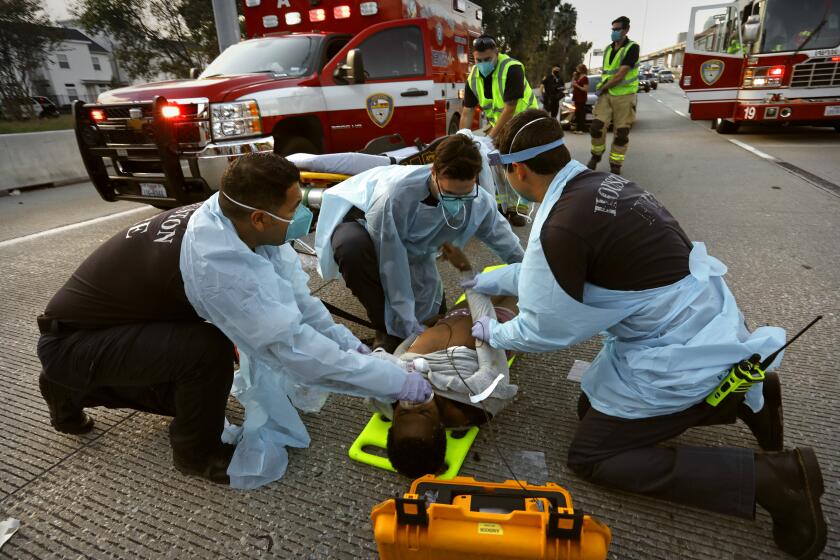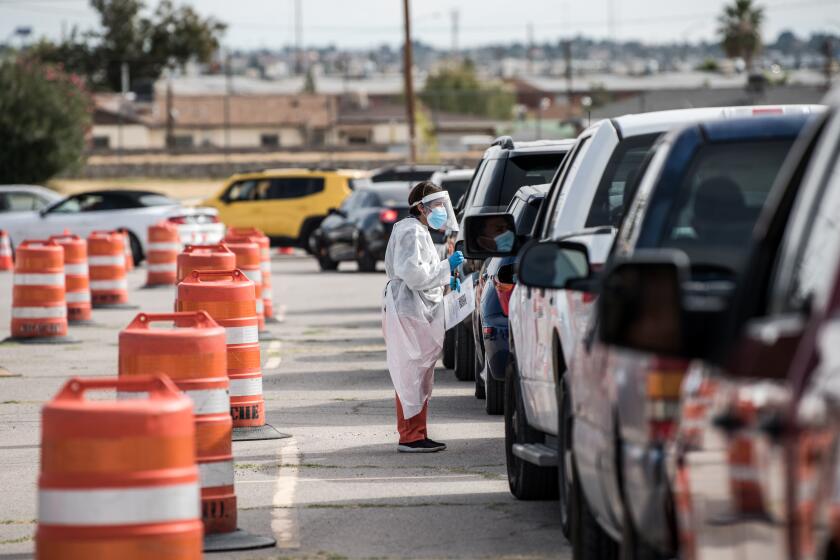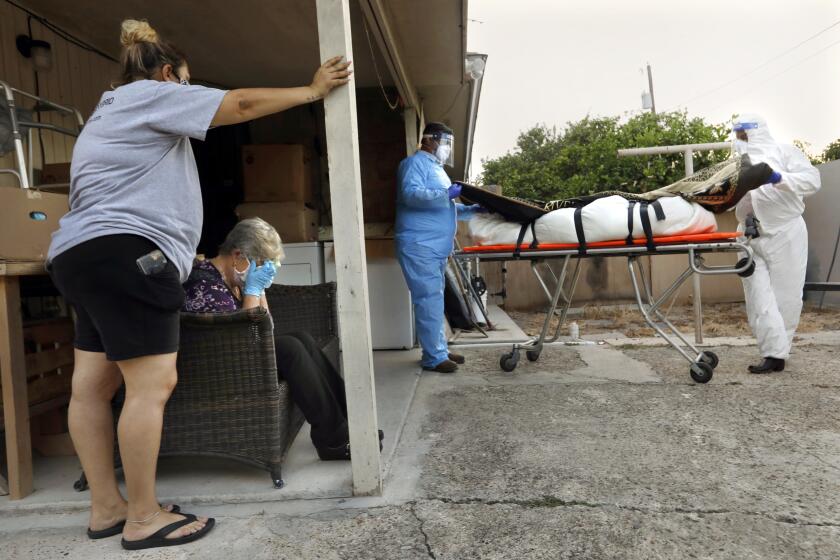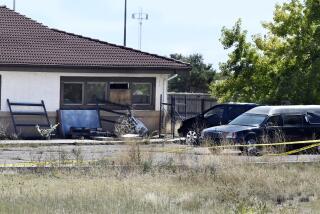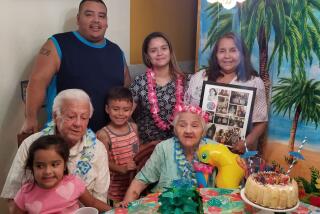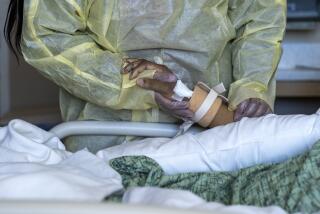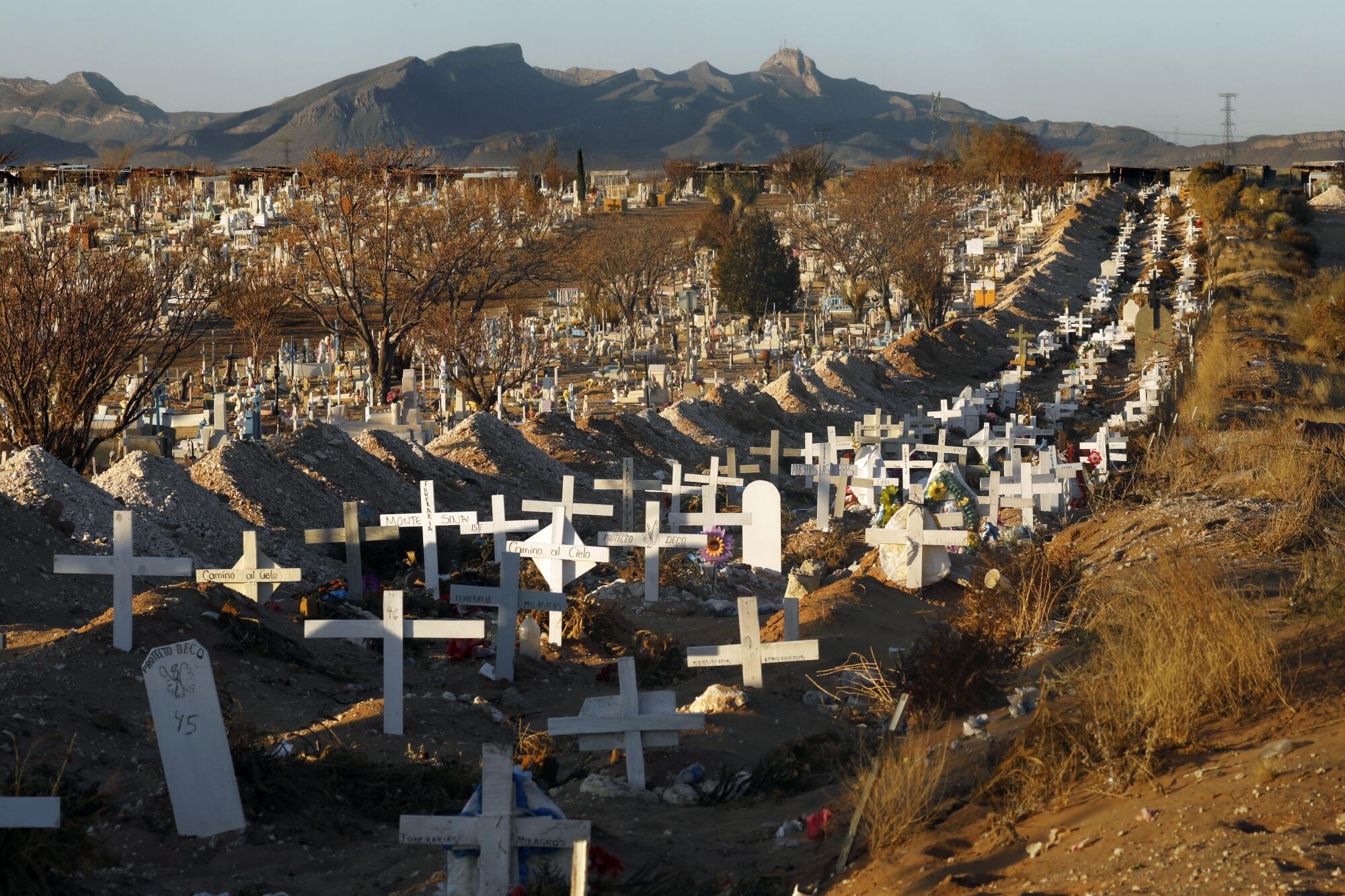
- Share via
EL PASO — Perches Funeral Homes has been burying bodies for more than half a century, through wars, cartel violence, epidemics and mass shootings, but nothing has filled its crematoriums, chapels and cemeteries like the coronavirus.
“The soonest I could do it is in two weeks,” funeral director Richard Villa told Brissa Leony, who had come to make arrangements for her grandfather last week.
Villa looked at her. He knew. He had almost lost his 87-year-old mother to the virus this year.
“Was it COVID?” he asked.
Leony nodded.
Villa made a note in the family’s paperwork. The latest surge in deaths has overwhelmed even a funeral director who has spent four decades laying people to rest.
Perches has had to cancel overnight velorios, or wakes, and delay burials and cremations. El Paso County this week had more COVID-19 cases per capita — 91,150 — than any other large metro area in Texas, with 1,282 deaths. Even more have died of COVID-19 across the border in Ciudad Juarez: 2,262.
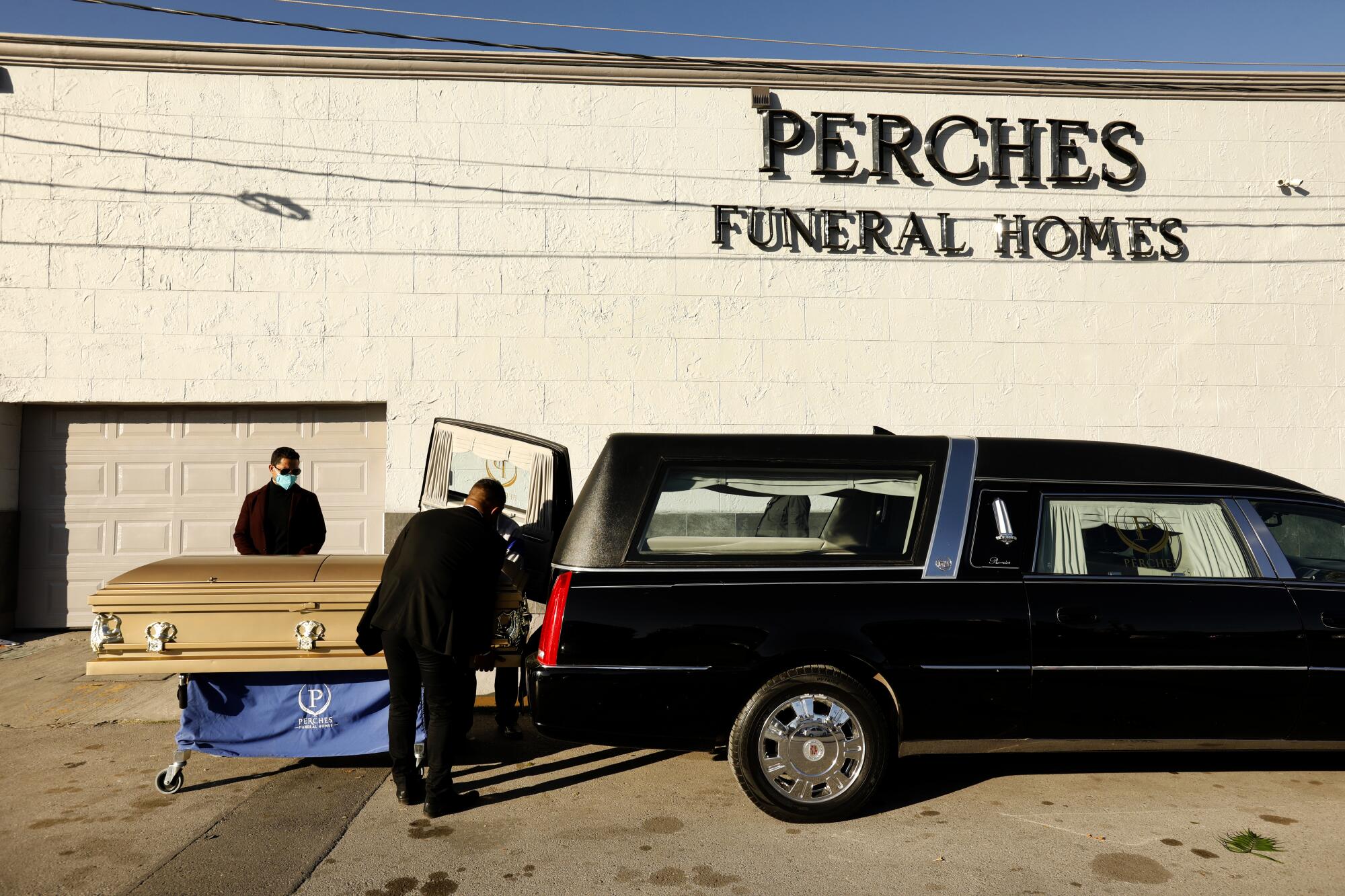
Heavyset and in a dark suit, Villa, 59, has the air of a man long past exhaustion. He sees no end in sight in this time of prayer cards and gravediggers. El Paso hospitals reported that only 13 of 400 intensive care beds were unoccupied last week. Hospitalizations are expected to increase again after the holidays, especially since local and state authorities have eased restrictions on business, travel and large gatherings.
Villa spends his days greeting walk-ins and answering phones.
“They’re taking a long time because of the COVID,” he told a caller concerned about delayed services.
Another caller didn’t want a relative’s body sent to the county morgue.
“We don’t have space,” Villa explained. “We have services every day.”
Since Salvador Perches Sr. opened his first funeral home in Juarez in 1958, the family has added seven branches in Juarez, six in El Paso and one each in Odessa, Texas, and in Las Cruces, N.M. They built an in-house museum with exhibitions about Mexican singer Juan Gabriel’s 2016 death (Perches handled the El Paso funeral and Juarez burial), Pope Francis’ 2016 visit to Juarez (Perches built the granite altar) and the racially motivated mass shooting last year at an El Paso Walmart (Perches offered victims’ families free funerals).
A new display about the pandemic is in the works.
“It’s hit us really, really hard,” said Salvador Perches Jr., 51, comparing the spike in deaths to cartel slayings that flared in Juarez from 2007 to 2012, when it became known as “Murder City.”
Back then, Perches funeral homes were shot up. The family was forced to pay extortion money, and employees feared for their lives at viewings. COVID-19 deaths are less bloody, but just as constant, he said, as is employees’ fear of catching the virus.
“This pandemic, it’s taking it to another level,” he said. “It’s nonstop.”
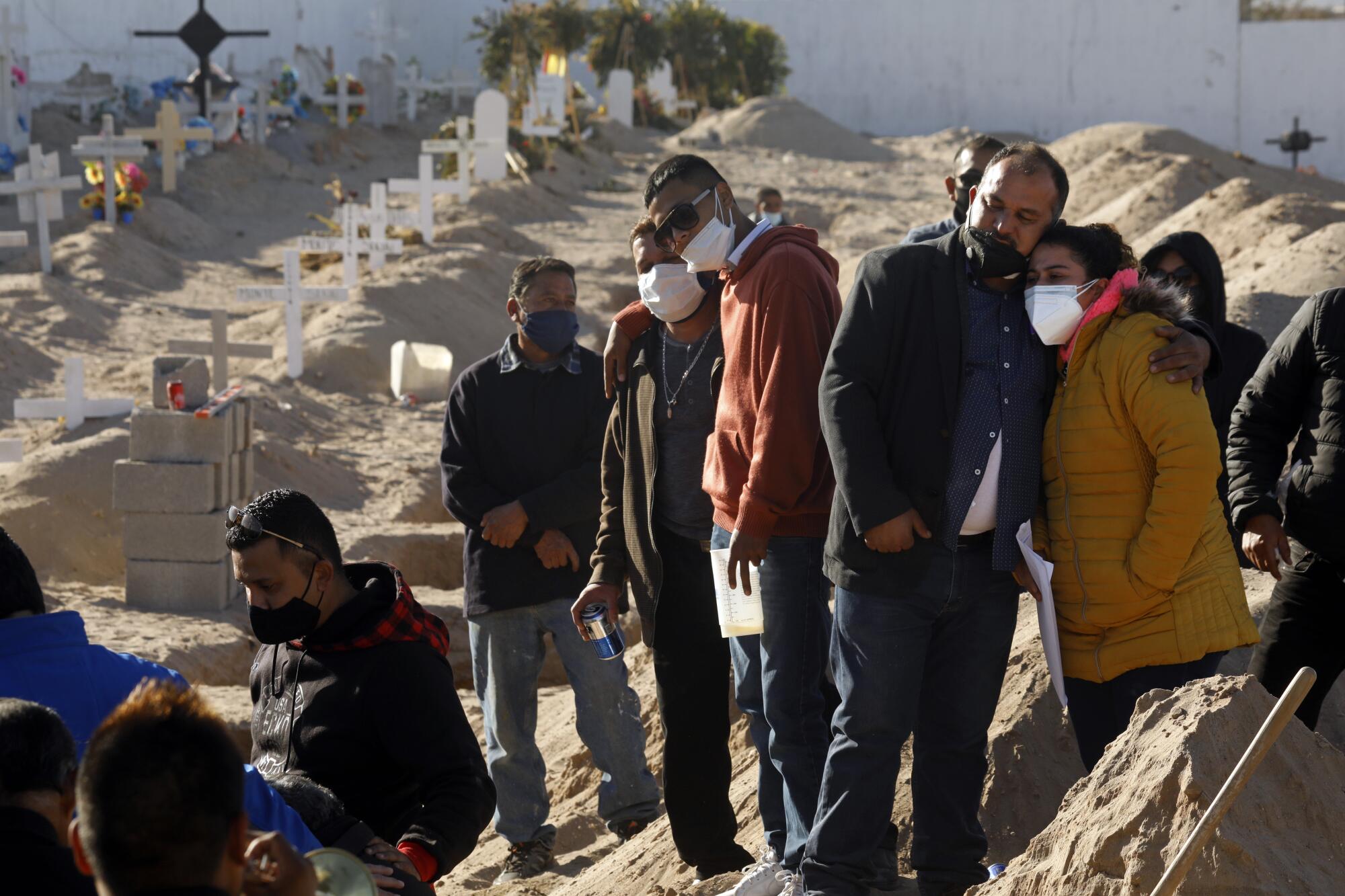
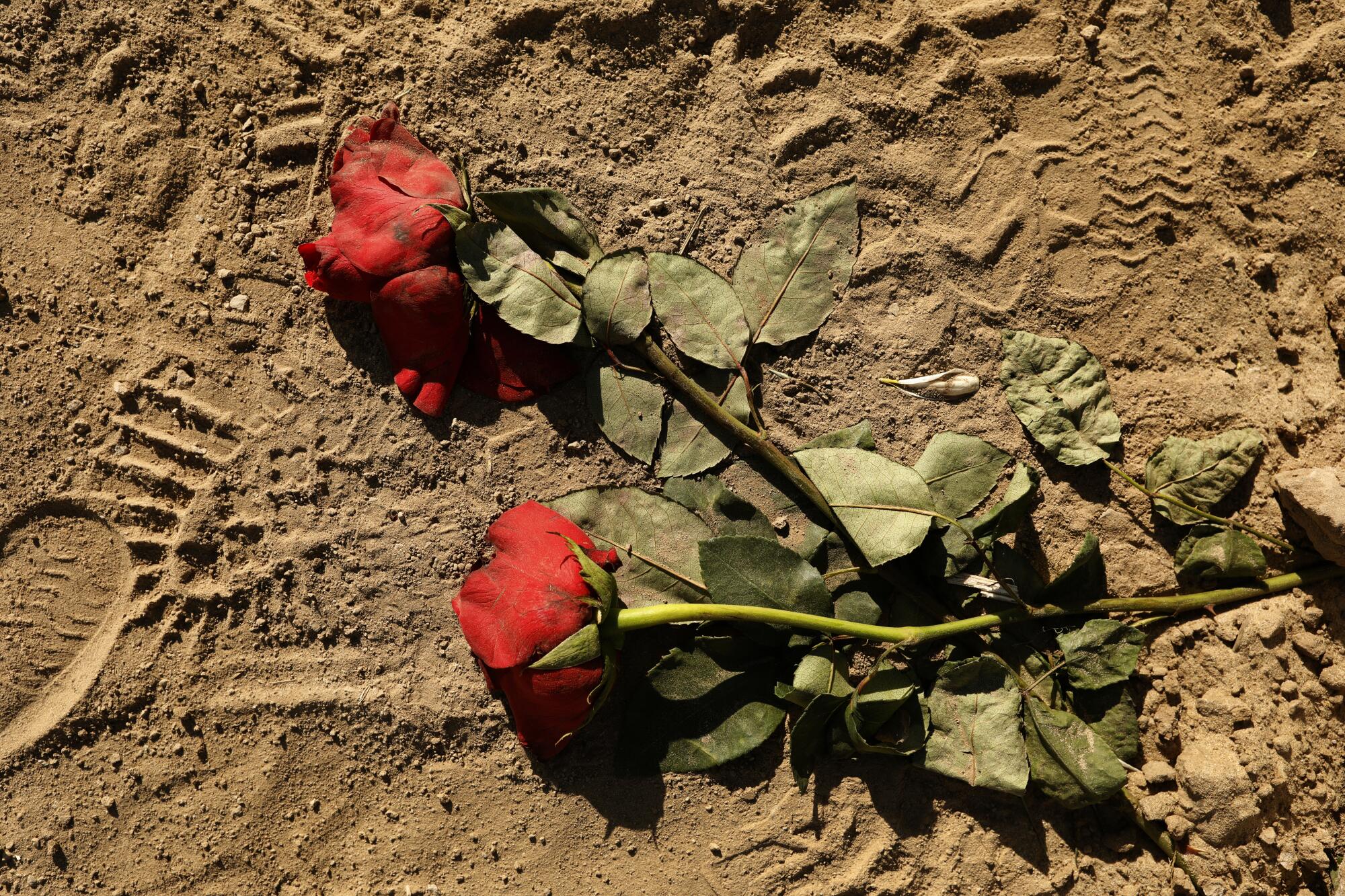
Each El Paso branch is doing more than 80 funerals a week, compared with 30 before the pandemic, said General Manager Jorge Ortiz. Juarez branches are even busier. Two cemeteries that Perches owns in Juarez and their crematoriums on both sides of the border are backlogged. And even as Perches has attempted to protect its staff with quarantines and other measures, it has lost a cemetery worker and three funeral directors to COVID-19, including Harrison Johnson, 65, who eulogized one of the Walmart shooting victims before a crowd of thousands and whose son works part time at the mortuary.
Rising deaths have forced a grim reconfiguring of the business: Perches has brought on 10 new staff members and is still hiring, Ortiz said. It has added crematoriums, converted an El Paso branch into a “COVID operations center,” bought new freezers and turned an El Paso chapel and a Juarez funeral home into coolers. It can now store about 400 bodies in the U.S., 500 in Juarez. But more families these days are opting for cheaper cremation, Ortiz said. Perches has raised prices 20% but suspects the pandemic will lead to a permanent shift.
“People say, ‘Oh, the funeral homes must be doing great business!’ But it’s not,” Perches said. “A $6,000 funeral became a $1,000 cremation. There’s more volume, but it’s not more business.”
Leony had planned that her grandfather Gabriel Guzman, an 85-year-old Head Start custodian who died of COVID-19 on Nov. 28, would be buried after a funeral Mass in El Paso. But the Catholic Diocese closed its churches weeks ago to stop the virus’ spread. Catholic priests do not generally perform funeral Masses outside church. Leony and her mother visited Perches last week to compare prices and consider options.
“We have a deacon, but a priest — no,” Villa said.
“At the viewing, how many people are allowed?” asked Leony, a registered nurse who works at a local emergency room treating COVID-19 patients and was aware of the risks.
The funeral home’s larger chapel fits 110 people, but Villa explained that they’re allowing only 50 at a time.
“You can’t have 50 in the chapel and more hanging around outside,” he warned.
Leony and her mother agreed. The trio walked to a nearby room to price caskets, settling on a gray metal model. Total estimated funeral cost: $4,671, not including flowers and cemetery services.
People don’t understand — they think things will just go on as always.
— funeral director Richard Villa
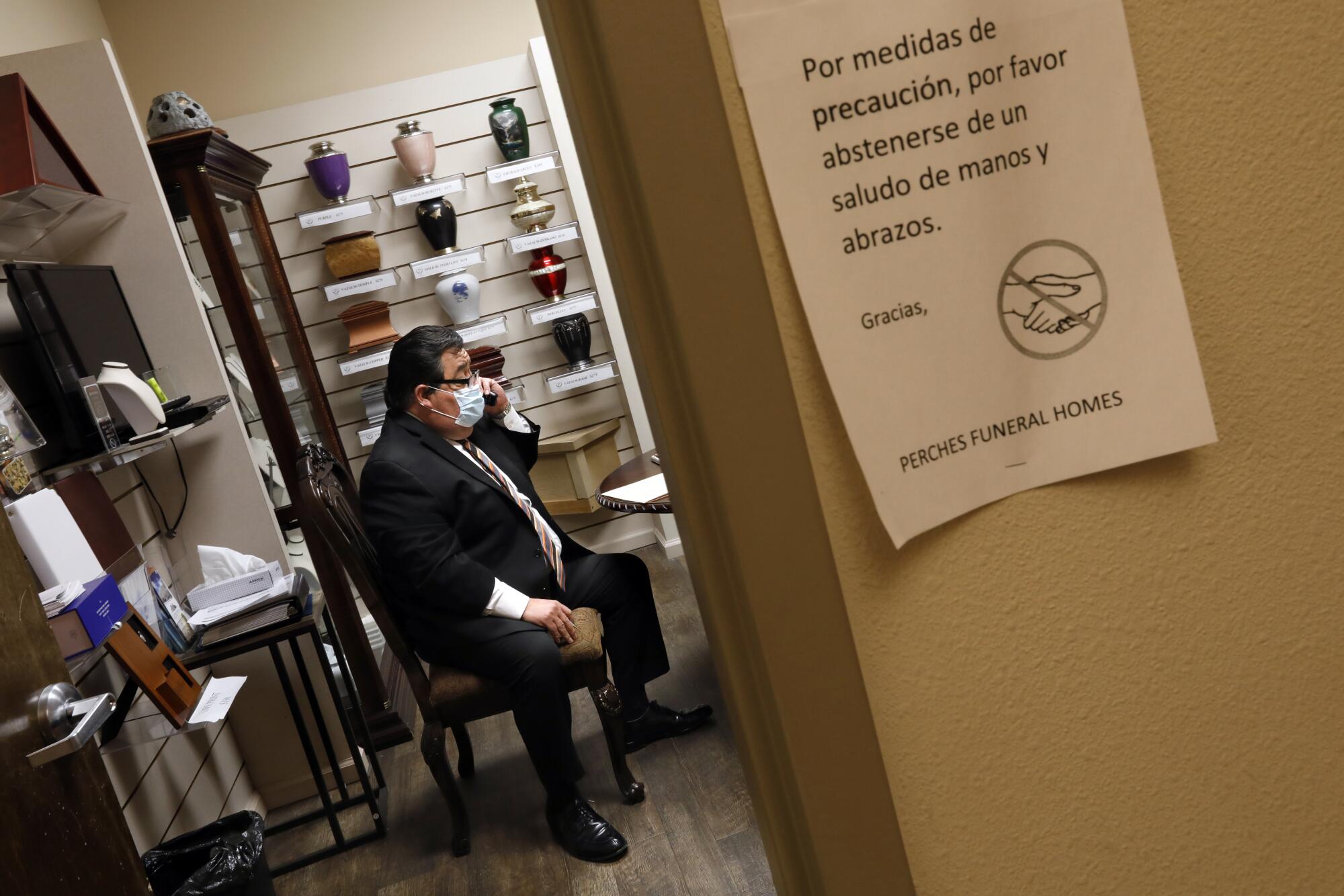
Villa had wanted to be an engineer; but when his father died when he was 16, he was impressed by how the funeral home (not Perches) handled the service. He has since grown accustomed to the fine print of death.
But it’s more complicated these days, with added restrictions and socially distanced grieving. He spends hours on the phone, switching between English and Spanish, breaking down costs, explaining pandemic delays and listing requirements. He offers families a clear plastic cover for open casket viewings, but many pass.
“People don’t understand — they think things will just go on as always,” he said between calls last week.
New problems fill his shifts in a city where inmates and the National Guard have been brought in to move bodies. The El Paso County clerk’s office, which normally issues death certificates, closed due to the pandemic, so Villa has to send death certificates 580 miles to Austin for approval. The paperwork must be signed by a doctor, he said, but during the pandemic, “sometimes the doctors, they’re so busy, they just sit on the certificates.”
Villa has diabetes and worries about catching the virus. Warning signs cover the door of the funeral home and its two chapels, advising visitors that they have to wear masks and cautioning against shaking hands or embracing. But some still do. And although the funeral home reduced its capacity, many more mourners usually show up for burials — sometimes scores.
“They’re not supposed to have that many, but you can’t control it,” Villa said.
Last week, about 45 mourners filed through services at Perches, then gathered to bury Aurora Duran, 65, who ran group homes for the mentally ill. She died of COVID-19 on Nov. 13.
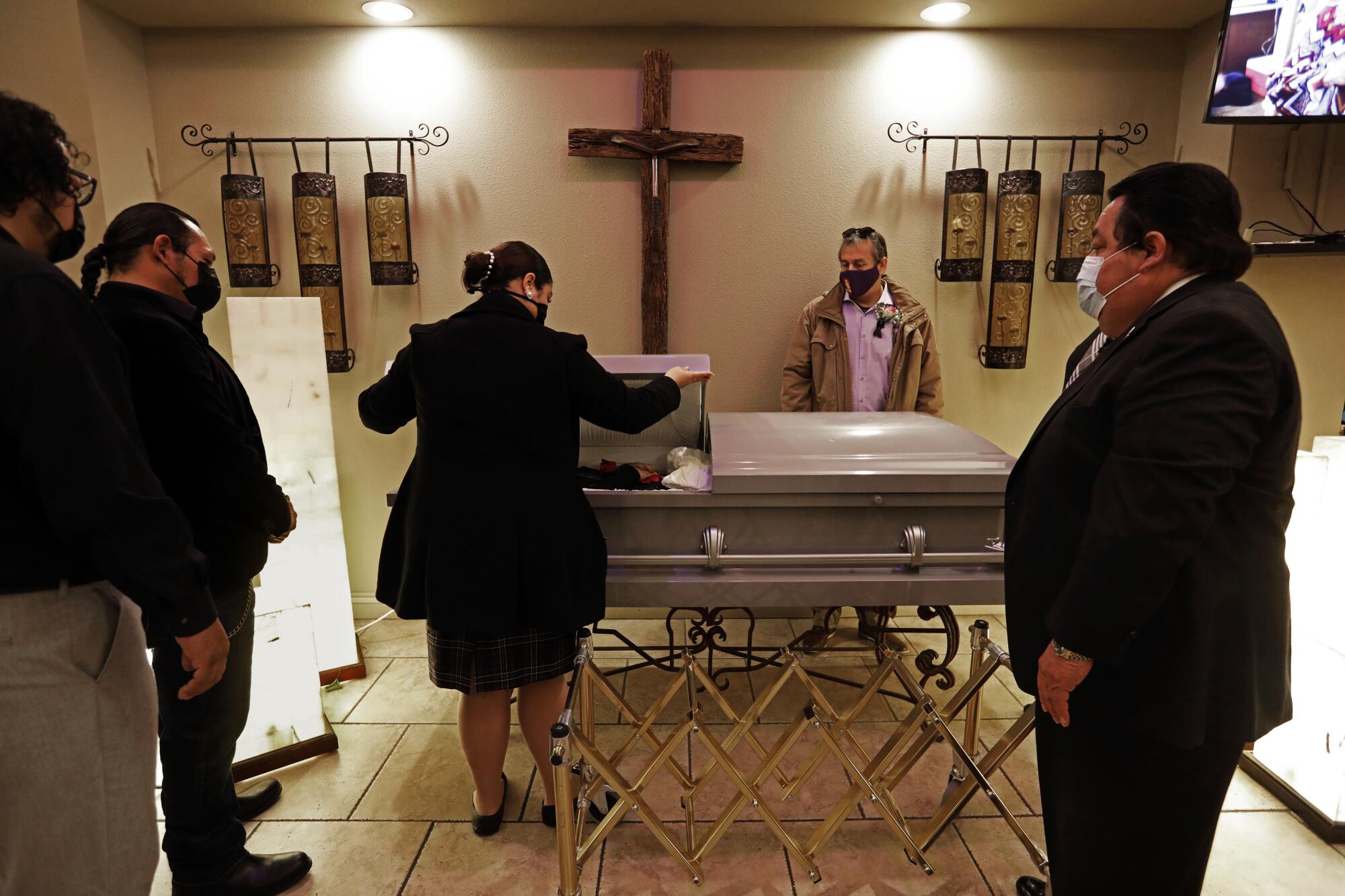
Surrounded by mountains and a few spindly pines, masked relatives crowded around Duran’s fresh grave, joined by unmasked mariachis who sang “Amor Eterno.” Duran’s son Dionicio “Danny” Duran played guitar, sang and spoke in tribute to his mother. After the funeral, he hosted relatives in his backyard for socially distanced beer and pizza.
“When they offered us the date, we jumped on it,” Duran said of Perches. “People are waiting up to three months.”
Duran, 43, said Perches had handled the funeral for his 82-year-old great-uncle the week before, who also died of COVID-19. His elderly aunt was hospitalized in intensive care with the virus.
“They took her off a ventilator today,” said his sister, Krystal Alvarado, 38.
We are not many but ... thank you, Mama, for taking care of us.
— Raul Arroyo
The next day, El Paso homemaker Marcela Arroyo, 44, hosted about a dozen relatives at Perches for the open casket viewing of her mother, Victoria Arroyo, 78, who died of COVID-19 at a nursing home on Nov. 3. Border restrictions kept many relatives from crossing to attend the viewing. But her brother Raul Arroyo, 49, a dairy worker who lives in Juarez, was able to fly in legally.
He stood up front and caressed his mother’s casket.
“This is the family we have,” he said, overcome with emotion. “We are not many but... thank you, Mama, for taking care of us.”
The following day — across the border in Juarez — pediatrician Victor Luévano Hidalgo, 46, was taken to Perches for funeral services and cremation after he died of COVID-19.
To limit mourners at his visitation, funeral home workers removed seating from the chapel and had visitors file past the open casket. All were masked. Some lingered near the doctor’s widow in the lobby, including doctors and nurses wearing scrubs.
Dr. David González Velazco, Luévano’s brother-in-law, said he had been hospitalized for weeks.
“We knew it was a risk to come, but my sister couldn’t see him for a month,” González said. “She needed to see him.”
Luévano had been exposed while treating a pregnant patient who arrived in labor and later developed a fever and other COVID-19 symptoms, said Dr. Ruben Meza, a colleague at the women’s hospital. Meza blamed Luévano’s death on a lack of protective equipment at the hospital, where doctors were provided only one mask per week. Luévano had to buy his own.
“He was very afraid of this, of getting sick,” González said. “We’re all afraid.”
In Juarez, funeral workers take added safety precautions with the dead. Bodies and caskets are often sealed in plastic. Some workers wear masks, gloves and white protective suits during burials. Panteón Recinto de La Oración, one of two Perches cemeteries, has had to hire added gravediggers to keep up as daily burials increased from two to a dozen.
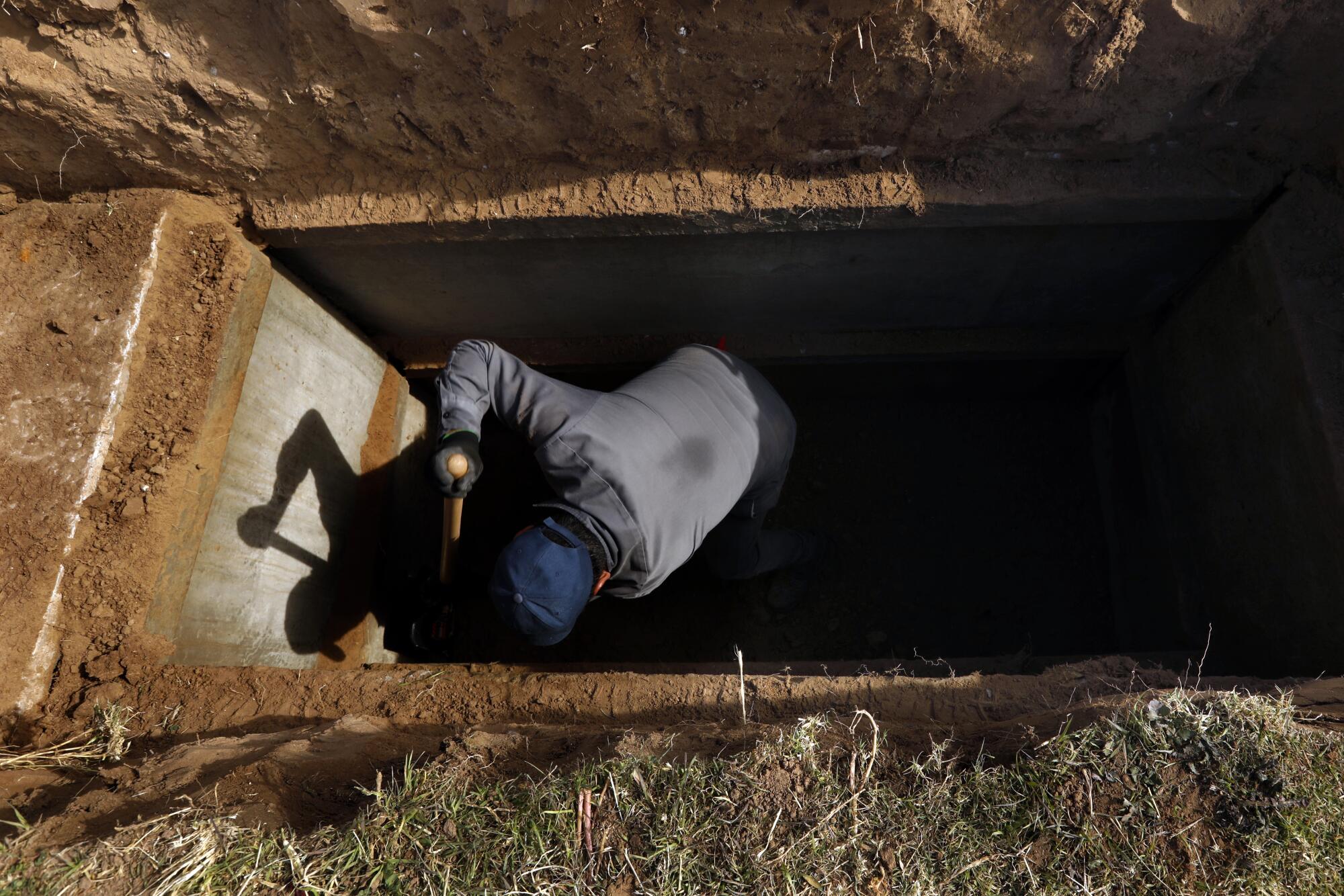
Angel Esparza, 30, started digging graves for Perches at the start of the pandemic when work at the border factory, or maquiladora, slowed. He’s wary of the virus; his older brother caught it last month and remains sick. Esparza lives with his 59-year-old diabetic mother, so he wears a mask at work, keeps his distance from mourners, sprays himself with Lysol when he returns home, then showers.
A dozen people arrived at the cemetery last week to bury Jose Manuel Lucio, 68, a Juarez paint shop owner who died of COVID-19 on Nov. 26. Perches limited the funeral service to 10 people and grave site service to 30.
Lucio’s widow and children surrounded the grave to lift a concrete headstone onto his vault. His son Manuel Lucio, 36, who caught the virus at the same time but survived, placed a sunflower on the grave. Lucio’s son-in-law, Carlos Morales, recalled how the family used to gather in El Paso on Sundays.
“Since the pandemic, we all stopped visiting,” he said — except at funerals.
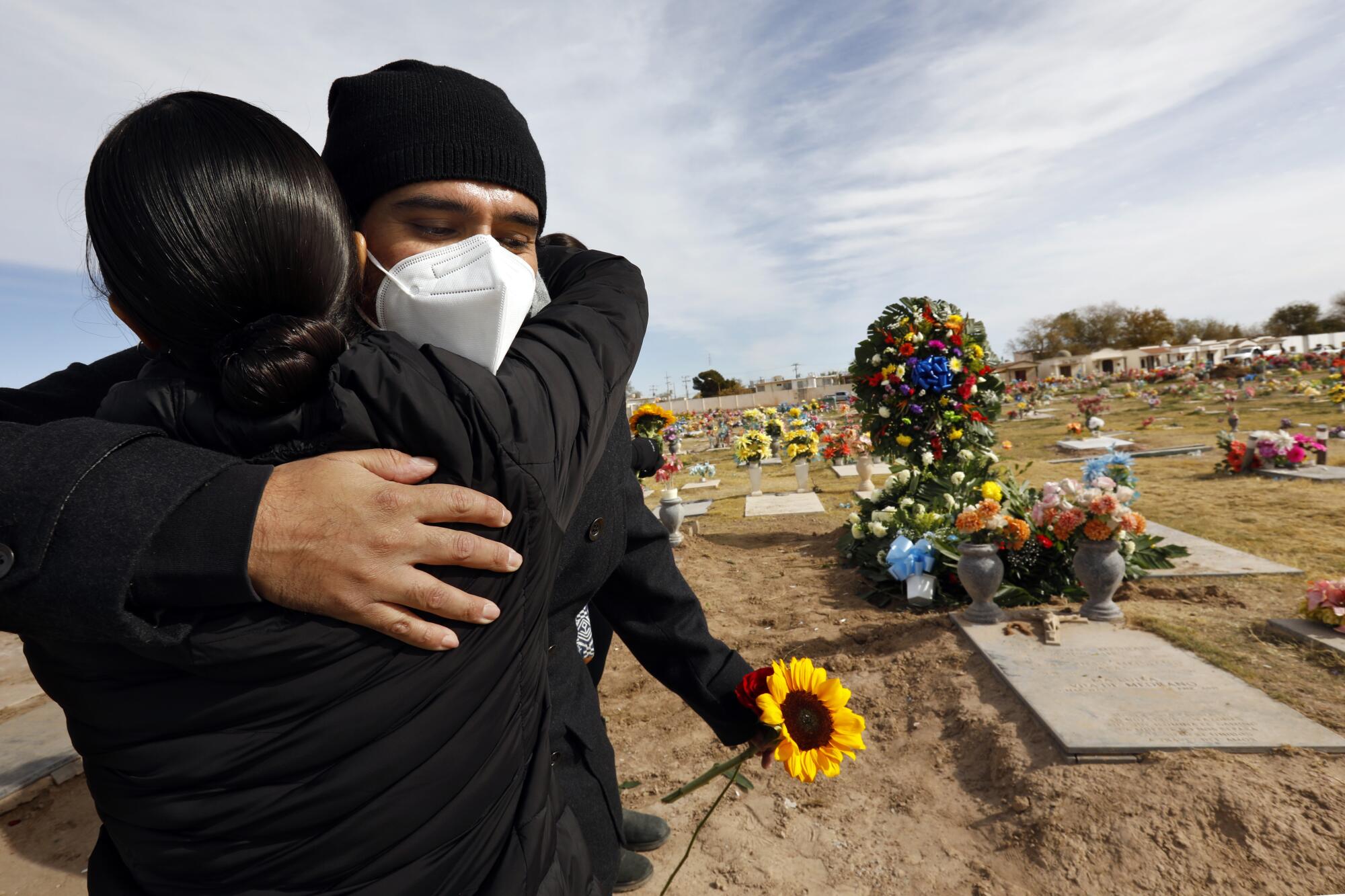
Perches ships bodies both ways across the border, at least one a day heading south to Juarez, where funeral costs are cheaper. COVID-19 dead are buried at both public and private cemeteries. The public Panteón Municipal San Rafael on the city’s southern outskirts already has 820 COVID-19 graves, three neat rows of white wooden crosses dating to October, each bearing the funeral home name on the back, including Perches.
The same crosses can be found at Panteón Sueños Eternos in a walled-off area dedicated to COVID-19 graves in the heart of the city. Five workers dug a grave by hand then fetched masks, gloves and white bodysuits before mourners arrived. So far, none of the gravediggers have caught the virus.
“It’s because they’re protected,” said manager Yuma Garcia, 30. “Not from the bodies, but from the families. And they keep their distance.”
Javier Valdez Martinez’s casket arrived wrapped in plastic. Dozens of cars followed through the cemetery gate. While the 50 mourners all wore masks, they lifted them to sip Tecate beer, wail and sing along with mariachis to “Amor Eterno.”
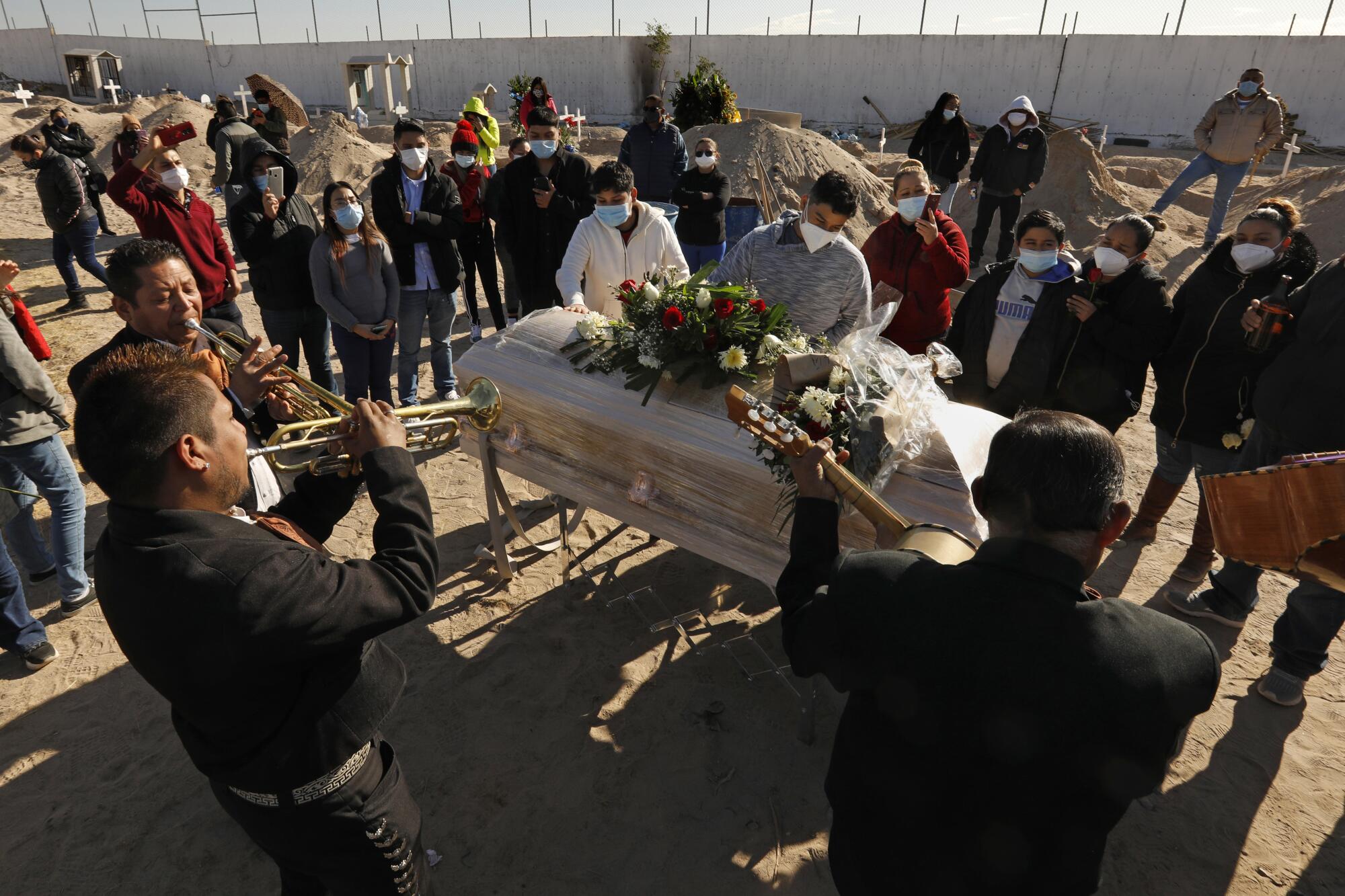
“Please, keep your distance family!” shouted daughter Karla Valdez, 27.
Her father, 55, ran a business loading supplies for border factories and had died of COVID-19 two weeks earlier. A diabetic, he’d been sick for a month. One of his sons also caught the virus, but survived.
Valdez said she would have preferred to see her father buried more quickly and in the main cemetery, instead of relegated to the COVID-19 area. She said it was frustrating not to have an open casket after he was quarantined for a month.
“For our protection, we can’t see him,” she said.
Valdez joined relatives surrounding and embracing the plastic-sealed coffin. Then she stepped back as white-suited workers lowered it into the grave.
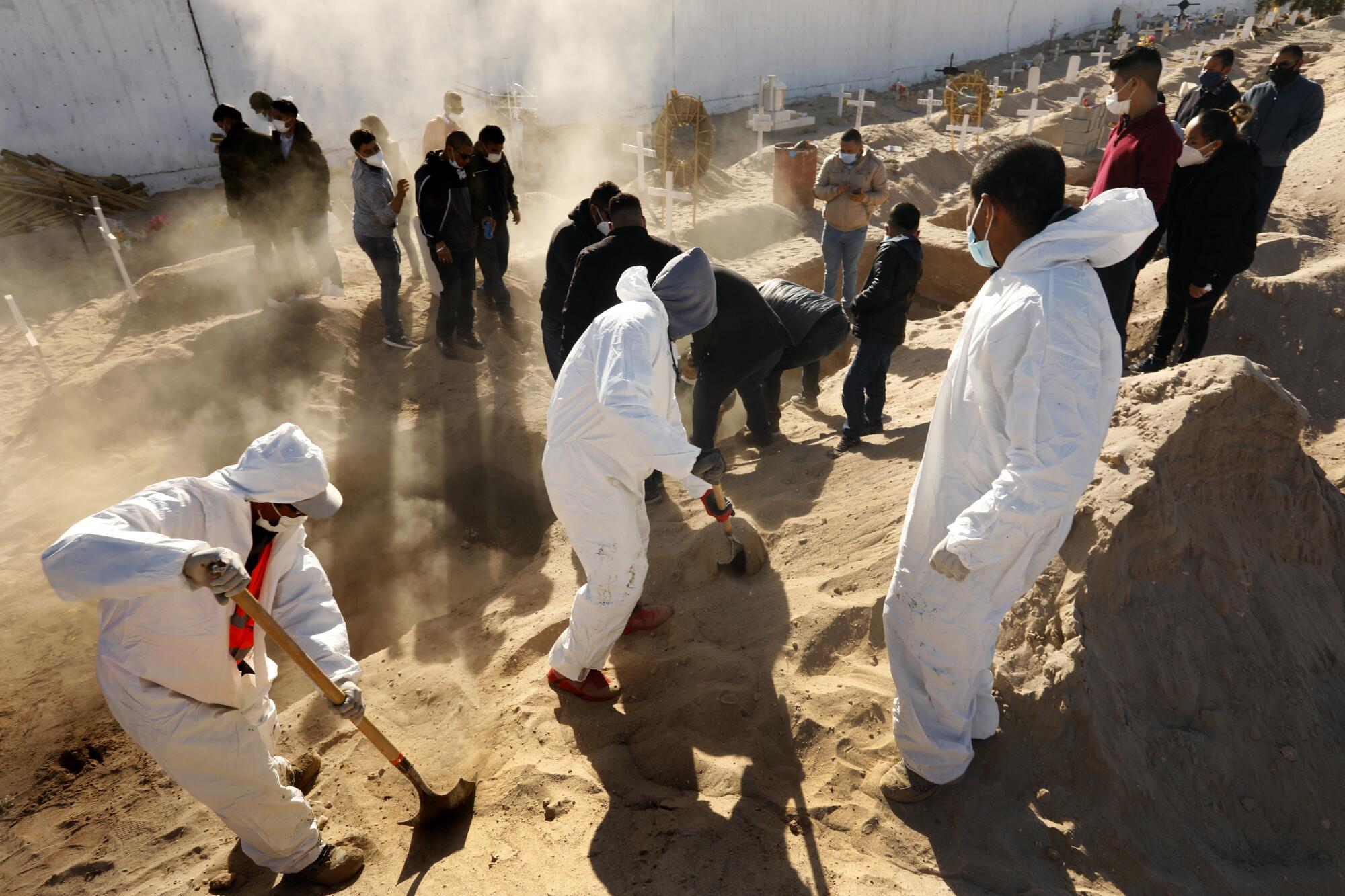
More to Read
Sign up for Essential California
The most important California stories and recommendations in your inbox every morning.
You may occasionally receive promotional content from the Los Angeles Times.
